At least seven people were killed and 16 others wounded on Monday after a powerful bomb explosion occurred outside a pro-government peace committee office in Wana, a key city located in South Waziristan district of Khyber Pakhtunkhwa province, Pakistan. The local police chief, Usman Wazir, reported the incident to The Associated Press.
The bombing specifically targeted the office of the peace committee, an organization that opposes the Pakistani Taliban and plays a vital role in mediating disputes among local residents. This attack took place just one day after the Pakistani military announced that its troops had killed 54 militants during a significant operation in the nearby North Waziristan district. The operation was aimed at thwarting militants attempting to cross into Pakistan from Afghanistan.
No group has taken immediate responsibility for the bombing; however, suspicions likely point towards the Pakistani Taliban, also known as Tehreek-e-Taliban Pakistan (TTP). This organization has a history of targeting both security personnel and civilians in the region. The TTP is distinct from the Afghan Taliban but maintains a close alliance with them. Following the Afghan Taliban's takeover of Afghanistan in August 2021, many TTP leaders and fighters found refuge across the border, emboldening their operations in Pakistan.
The situation in South Waziristan, historically a stronghold for the Pakistani Taliban, remains precarious. The peace committee, which has been actively working against the influence of the TTP, now faces increased threats in light of this attack. The bombing highlights the ongoing violence and instability in the northwest region of Pakistan, which has been a focal point for militant activities for years.
In summary, the recent bombing in Wana underscores the fragile security situation in South Waziristan and the persistent threat posed by militant groups such as the TTP. As the local community deals with the aftermath of the attack, the role of organizations like the pro-government peace committee becomes increasingly critical in mediating local disputes and promoting stability in the region.











